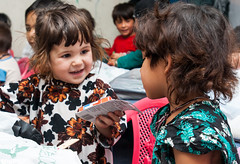To force our kids to share or let them not share? This is something that causes a lot of anxiety in parents. You see, our kids naturally don’t really want to share so when we’re in a social situation and our kids are being, well, kids, we can feel horribly judged and rude when our child refuses to share any of their toys and snatches those toys back from the poor, unsuspecting visitor. Most parents start with the request that the child share, following by a bit of pleading mixed with reasoning, and then finally force or punishment. The question we have to ask ourselves is if this works and if it does, to what end?
Understanding Children’s Sharing
Most of the time we think about sharing as being a simple construct – you share or you don’t – but it’s not quite that simple. As adults we often have various nuances when it comes to sharing; for example, we will share things that we don’t highly value but often won’t lend out, say, our wedding rings. We also are more likely to share with those people we know and trust than to a complete stranger. These things matter because they influence the risk associated with sharing behaviours; we are more likely to perceive never getting an item back from a stranger than we are a close friend (or if they don’t, we at least know where they live).
In research on sharing, we see that kids show some of these similar traits. In one study with 3- to 6-year-olds examining the role of need and social relationships on sharing behaviour, children were found to share more with a rich friend than a stranger in need, highlighting that same element of familiarity and liking that us adults display[1]. Other factors also impact children’s sharing behaviours are strongly linked to development; for example, children are first able to identify that people should share years before they are actually doing it[2] and this lack of sharing occurs even though children as young as 3-4 are adverse to inequality even when it benefits them[3]! Other cognitive and social developmental factors linked to sharing include theory of mind development[4], delay of gratification[5], inhibitory control[6], and understanding of others’ distress[7]. Even in older ages when sharing is more established (around ages 7-8), it can be undone through simply priming of getting kids to think about themselves instead of others[8], highlighting the very precarious nature of this behaviour.
Notably, in all of this research, children are really giving away items that didn’t belong to them before the experiment, not being asked to share their own items that they presumably have a bond with. Sharing our own precious things is bound to create even greater resistance to sharing. It’s like the difference between being given two new phones and having the option to give one away (while keeping the other) versus being asked to hand your over and hope you get it back. This is why even in resource allocation tasks, there is a difference in how kids share when they feel what they have is their own (e.g., earned rewards) versus sharing items that don’t belong to them; needless to say, they are less likely to share when it is costly for them[9] which means the kids not sharing at home seem to be behaving in a very logical manner.
What I hope this makes clear is that sharing behaviour is really not something children are primed to do. It takes years of knowing people should share before children actually do this on a regular basis. Our expectations for our children are completely out of whack with what they are inclined and capable of doing on their own. Does this mean that forced sharing is the answer? No.
Techniques for Handling Sharing
Although we can say that sharing is not a normal behaviour, it is something that we hope to teach our children and something that is often culturally expected of us. In many cases, the fear we have isn’t about our kids never sharing, but the judgment from others. These techniques can hopefully help you find ways to handle this issue both in the home and when talking to other parents:
- Put favourite toys aside for visits. If your child is old enough, have them help by going through their toys and picking out the ones they don’t want to share then put them away somewhere until after the visit is over.
- Have special toys for visitors. Toys that are inherently always known as “shared toys” may be easier for the child to share as they don’t see them as “belonging” to them. These go away outside visits and so they are exciting for all kids involved.
- Ask your guests to bring some toys. If the guests bring toys then each child will probably want to check out the other toys and this offers a gateway to discussing sharing without forcing.
- Don’t force the other child to share with yours. Modeling this for other parents is great for them to see it’s not just favouritism for your kids, but that you don’t want to set the stage for forced sharing period.
- Talk open and honestly with the other parent. Whether it’s because you forgot a special toy and it becomes an issue or you see the sideways looks when you don’t force an issue of propriety, it’s okay to say something like, “I know this seems really weird that I’m not forcing it, but this is why…” Parents may disagree, but the more clear and honest you are, the less they will be able to hold it against you because they see it’s not laziness or favouritism, but rather an actual plan of action. You may even convert a few people.
_______________________________
[1] Paulus M. Friendship trumps neediness: the impact of social relations and others’ wealth on preschool children’s sharing. Journal of Experimental Child Psychology 2016; 146: 106-120.
[2] Smith CE, Blake PR, Harris PL. I should but I won’t: why young children endorse norms of fair sharing but do not follow them. PLoS One 2013; https://doi.org/10.1371/journal.pone.0059510.
[3] Ulber J, Hamann K, Tomasello M. Young children, but not chimpanzees, are adverse to disadvantageous and advantageous inequalities. Journal of Experimental Child Psychology 2017; 155: 48-66.
[4] Wu Z, Su Y. How do preschoolers’ sharing behaviors relate to their theory of mind understanding? Journal of Experimental Child Psychology 2014; 120: 73-86.
[5] Paulus M, Licata M, Kristen S, Thoermer C, Woodward A, Sodian B. Social understanding and self-regulation predict pre-schoolers’ sharing with friends and disliked peers: a longitudinal study. International Journal of Behavioral Development 2015; 39: 53-64.
[6] Paulus M et al, 2015.
[7] Paulus M et al, 2015.
[8] Weltzien S, Marsh LE, Hood B. Thinking of me: self-focus reduces sharing and helping in seven- to eight-year-olds. PLoS One 2018; https://doi.org/10.1371/journal.pone.0189752.
[9] Smith CE et al, 2013.







Leave A Comment